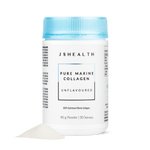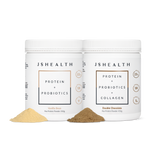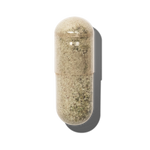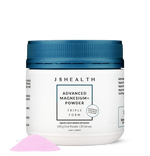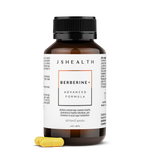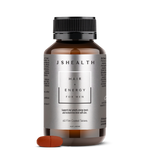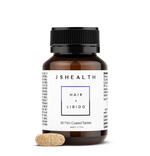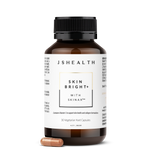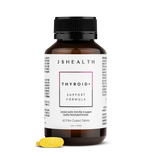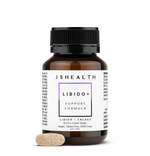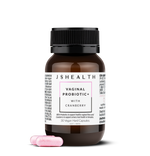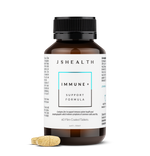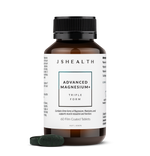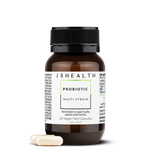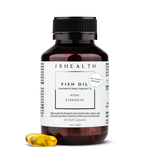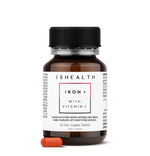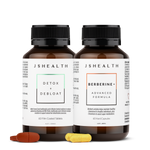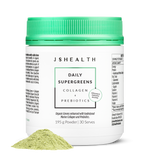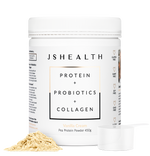Reset Your Gut: 5 Effective Ways To Cleanse Your Digestive System
The gut is often referred to as the body's "second brain," and for a good reason. It plays a crucial role in digesting the food you consume, absorbing vital nutrients and keeping harmful pathogens at bay.
Here’s a common experience: an upset stomach, uncomfortable gas, and unpleasant bloating. As a byproduct of the modern lifestyle, our digestive system can become overwhelmed with processed foods, stress and lack of movement.
It may be time to consider a little reset. Just as we find solace in a weekend retreat or a day off, our digestive system, too, occasionally needs some TLC to function at its best.
Understanding the Digestive System
The digestive system is a complex and intricate network, beginning at our mouth and extending all the way to the rectum. Throughout this long pathway, various organs work in tandem to break down food, extract essential nutrients and expel waste.
For many, the digestive process is something we hardly give a second thought to until something goes awry. However, a well-functioning gut is paramount for overall health.
It's not just about avoiding discomfort or bloating; the gut ensures the body receives the nourishment it requires to power daily activities. Furthermore, a significant portion of the immune system resides in the gut, emphasising its importance in overall health and disease prevention.
Moreover, the digestive system houses a diverse community of microorganisms, often referred to as the gut microbiome. This ecosystem plays a pivotal role in various functions beyond digestion, including mental health, immune response and even the synthesis of certain vitamins. Ensuring the gut is in top shape means caring holistically for wellbeing.
Maintaining a balanced and efficient digestive system is more than just a means to an end; it's a commitment to a more vibrant, energetic and health-conscious self. And sometimes, that commitment starts with a reset.
The Signs Your Digestive System Needs a Reset
When our digestive system is out of sync, it doesn't remain silent. Much like a car signalling with a flashing light when it's low on fuel or needs maintenance, our gut often sends us clear signals when it requires attention.
Recognising these signs is the first step toward nurturing and resetting our gut health.
- Bloating and Gas: Gas is one of the most common indicators that all's not well in our digestive tract. While occasional bloating can be a natural response to certain foods, consistent or extreme bloating may suggest an imbalance in our gut flora or difficulty breaking down specific foods.
- Irregular Bowel Movements: Constipation or diarrhoea might indicate that our digestive system isn't processing foods as efficiently as it should. Regular bowel movements are a sign of a healthy digestive flow.
- Persistent Heartburn or Acid Reflux: Experiencing a frequent burning sensation in the chest or throat may hint at an issue with stomach acid balance or food processing speed.
- Unexplained Fatigue: Surprisingly, gut health can significantly influence energy levels. Poor digestion might lead to suboptimal nutrient absorption, leaving you with a feeling of consistent fatigue.
- Frequent Stomach Cramps or Upset Stomach: Persistent discomfort or pain can be a signal that our digestive system is struggling with something, be it certain foods, an imbalance of bacteria, or other internal factors.
- Food Sensitivities: Developing sudden sensitivities or intolerances to foods previously enjoyed without issue can be a telling sign. It suggests that the gut's protective barrier might be compromised, leading to reactions against certain foods.
While some might experience one or more of these signs occasionally, it's essential to listen to your body. If these symptoms persist or impact our daily life, it might be time to consider giving your digestive system a little more of the attention and care it deserves.
5 Effective Ways To Cleanse Your Digestive System
Resetting your gut doesn't necessarily mean resorting to extreme detox regimes or strict diets. It's about incorporating simple, sustainable practices into our daily lives.
Here are five proven ways to give your digestive system the refresh it might be seeking:
Fibre-Rich Diet
Why It Helps: Fibre is like a gentle broom for the digestive tract. It adds bulk to stools, ensuring regular bowel movements and helping remove waste efficiently from our bodies. Soluble fibre, in particular, acts as food for the beneficial bacteria in the gut, fostering a balanced microbiome.
How To Incorporate: Embrace whole grains like quinoa, barley and oats. Enjoy a range of fruits and vegetables, particularly leafy greens. Consider snacking on nuts, seeds and legumes. And if you're seeking a delicious, fibre-rich start to your day, consider a smoothie blended with chia or flax seeds.
Stay Hydrated
Why It Helps: Water is a foundational element in our digestion process. It aids in breaking down food, ensuring smooth movement within the intestines, and facilitating nutrient absorption.
How To Incorporate: Aim for at least eight glasses of water daily, though individual needs might vary. To make it a ritual to look forward to, start your day with a warm glass of lemon water. Herbal teas, like chamomile or peppermint, can be an excellent addition, especially as they also soothe the digestive system.
Mindful Eating
Why It Helps: Digestion begins in the mouth. Thoroughly chewing your food eases the load on your digestive system. Mindful eating also allows you to tune into your body's hunger and fullness cues, ensuring you don't overburden your digestive system.
How To Incorporate: Dedicate time for meals. Sit down, minimise distractions and focus on the flavours, textures, and aromas of your food. Chew slowly, savouring every bite. It's not just about health, but also about being grateful for the joy that food brings.
Probiotics and Prebiotics
Why It Helps: Think of probiotics as the friendly troops in your gut and prebiotics as their nourishment. Together, they work to maintain a balanced gut environment, supporting digestion and keeping unfriendly bacteria at bay.
How To Incorporate: Fermented foods like yoghurt, kefir, sauerkraut and kimchi are rich in probiotics. For prebiotics, consider foods like garlic, onions and asparagus. If you're thinking about supplements, it's wise to consult with a healthcare professional to find the best fit for your needs.
Limit Processed Foods and Sugars
Why It Helps: Processed foods and excessive sugars can disrupt the balance of your gut bacteria and lead to inflammation. They might also slow down the digestive process and lead to feelings of bloating or discomfort.
How To Incorporate: Focus on whole foods. When shopping, lean towards the peripheries of the supermarket, where fresh produce, meats and dairy are usually located. Take time to read ingredient labels and be cautious of items with a long list of unfamiliar ingredients. Every meal is an opportunity to nourish our body, so let's make each one count.
Additional Tips To Support Your Gut Health
The journey to caring for your gut health doesn't end with these five strategies. Like any relationship, the one with our digestive system thrives on continuous support, patience and understanding.
Here are a few more tips to help you foster a flourishing gut:
Natural Colon Cleanses
Periodic natural colon cleansing can aid in removing build-up in the large intestine and promote regular bowel movements. Popular methods include the saltwater flush — drinking lukewarm water mixed with sea salt on an empty stomach.
However, it's essential to note that while many swear by its benefits, others report cramping or other side effects. As always, consult a healthcare professional before trying new wellness practices.
Incorporate Digestive Enzymes
Sometimes, your body might need a little help breaking down certain foods. Digestive enzymes, available in certain foods and supplements, assist in this process.
Foods rich in natural enzymes include pineapple, papaya and honey. If you are considering enzymesupplements, be sure to seek advice from a healthcare provider.
Colonics and Enemas
These medical procedures involve introducing water, sometimes mixed with other substances, into the rectum to cleanse the colon. Colonic hydrotherapy or colonic irrigation uses larger amounts of water, while enemas utilise a smaller volume.
While many individuals report feeling lighter and more refreshed after these treatments, it's essential to be aware of potential side effects and consult a professional.
Antioxidant-Rich Foods
Antioxidants fight against free radicals in the body, which can cause damage to your cells. By including foods rich in antioxidants, you support your gut and overall wellbeing. Berries, nuts, dark chocolate, spinach and artichokes are great options.
Limit Laxative Use
While laxatives can provide relief from constipation, frequent use can lead to dependency and disrupt natural bowel movements. Instead, aim for dietary changes, plenty of water and natural remedies to encourage regularity.
Apple Cider Vinegar
Many believe that a tablespoon of apple cider vinegar in a glass of water, taken daily, can support digestive health. The acids in apple cider vinegar may help with digestion and soothe bloating. However, it's crucial to dilute it to avoid any potential digestive issues.
Aloe Vera
Known for its soothing properties, aloe vera can also support digestive health. Drinking aloe vera juice can help with regular bowel movements and alleviate symptoms of an irritated digestive tract.
Stay Active
Regular physical activity encourages the digestive system to stay active and efficient. Whether it's a brisk walk, yoga or more intense activities, find something you enjoy and make it a regular part of your routine.
Conclusion
Resetting the gut is a testament to the importance we place on our holistic health. It's a journey of rediscovery, understanding your body's signals and responding with love and care.
By integrating these practices, you support your digestive system and embrace a lifestyle that champions overall wellbeing, vitality and balance.
At JSHealth, we're with you every step of the way, championing a life rich in nourishment, based on balance and free from fad diets and unnecessary restrictions. Here's to a happy, healthy gut!
Sources:
Gut-Brain Connection: What It is, Behavioral Treatments | Cleveland Clinic
The Brain-Gut Connection | Johns Hopkins Medicine
Digestive System: Function, Organs & Anatomy | Cleveland Clinic
Probiotics and prebiotics: What you should know | Mayo Clinic


